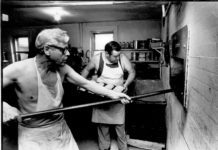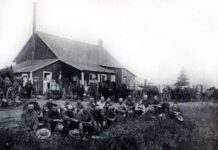This is Heritage Week in Ontario, and, following our special heritage issue last week, it seems like a good time to think a bit about what heritage means to us now. Heritage is not the preserve of the few, the cultural elites of a community; it is a matter of our day-to-day lives, something that defines us. The wonderful news that the Service Ontario offices will remain in Kemptville is a heritage story. If that service had left the community, something intangible would have gone too. The loss would have somehow diminished the importance of Kemptville for people in the region, the focus would have shifted somewhere else, to another municipality where we would have to look for our interactions with the province.
Just as the downtown of Kemptville lost something when the big box stores set up by the 416, taking away the status of the traditional heart of the community, these losses can destroy the sense of history and heritage upon which a community’s identity is often based.
In the same way, the dreadful announcement that two rural schools may close next year is also a heritage story. Because those schools are more than buildings, they are community centres, places where our children grow up and develop a sense that they belong to a specific place. Busing kids from Wolford Public School to Smith’s Falls, or from Oxford-on-Rideau into Kemptville, takes away that sense of belonging, and turns the abandoned site into less than a neighbourhood.
Neil Young described that idea very clearly in his song “Helpless”: “There is a town in north Ontario, with dream comfort memory to spare. And in my mind I still need a place to go, all my changes were there”. Schools, corner stores, playgrounds, community halls, even government offices, all play a part in creating and developing our sense of history and heritage. They are central aspects of our common story. People used to go to the store and sit around the stove catching up on the news and the gossip. The community came together in the church hall for dances, dinners and concerts, usually put on by neighbours, friends and the people you went to school with.
There was a time, not so long ago, when locals boasted of their town, their village, their neighbourhood and indulged in semi-serious rivalries with other communities in sports and activities. Now, the curse of the city is descending on rural Ontario: people don’t know their neighbours, don’t know, and are not known by, the people they pass in the supermarket or coffee shop. It hasn’t happened here yet, but you can see it slowly coming to pass.
So, you see, heritage is part of us, part of the buildings we use, the activities we follow, the things that make life better. We are often told that we must grow, or die. So we grow houses and big box stores, and we destroy the old ones to make room for more. The irony is that, by growing, we often die. We often kill the very things we used to cherish, and replace them with something less. Can we really be “Green and Growing”? As every little space between houses is built on, are we making our communities better? When the official motto of the United Counties is “Where lifestyle grows good business”, does anyone know what that means? When did lifestyle and business become so intertwined?
I am a city boy by nature. Until I moved to North Grenville, all these decades ago, I lived exclusively in cities: Dublin and Ottawa mostly. Maybe that gives me a better perspective on rural life, the unique and irreplaceable things that are being put aside in order to “grow or die”. Heritage does not mean we stay in the past and never improve our quality of life. There is no one golden age to which we should return and remain. But, as we move ahead, we need to hold on to what has been given to us that is of value.
There has been too much heritage vandalism in this area already. Councils tore down the old Post Office in Kemptville and we lost the old mill that gave Oxford Mills its name and identity. More recently, the heritage vandals on the NG Council sold a unique heritage asset in the Acton’s Corners School property, a site that could have been an economic engine in heritage tourism for the municipality. Barb Tobin, the last remaining member of that vandalising council, told the Heritage Committee to mind its own business, (heritage was its business, of course). If we lose these tangible elements of our history and heritage – the schools, community halls, general stores, and others – we will certainly begin to lose the intangible elements too. Then we will really be that dormitory suburb of Ottawa that seems to be our destiny at the moment.










there are formal definitions of these terms:
heritage (noun of history): mistakes made by your ancestors.
heritage feature (n): a mistake, made by your ancestors, that you’ve gotten used to.